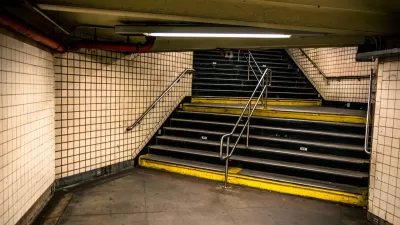The autism community is faced with a housing crisis that could from bad to worse if housing standards end a waiver program that allows group homes for people with intellectual and development disabilities.
Amy S.F. Lutz provides in-depth coverage of an emerging crisis for the autism community around the country. To illustrate the scale of the crisis, Lutz writes:
Right now, 80,000 autistic adults are on waiting lists for residential placements that can be up to 10 years long, and the nonprofit advocacy organization Autism Speaks estimates that half a million autistic children will transition to the adult state-by-state funding system over the next decade.
Despite the current and expected crisis, new federal rules would end a waiver program that allows some states to permit group houses that congregate communities of larger than four individuals. The problem, according to Lutz, is that "[c]ongregate settings for people with intellectual and developmental disabilities (I/DD) have been discouraged for years." The prevailing policies stem from conditions revealed in the 1960s. "It seemed pretty simple: community good, institutions bad. But these two terms have proven extraordinarily difficult to pin down. Is the difference merely one of size?"
Some states are poised to answer the question by adopting standards established by the National Council on Disability in 2011, defining "institutional settings as housing situations in which more than four people with I/DD" live in a single home.
Those standards, however, don’t reflect the kind of community living that benefits individuals with severe autism, which will limit scant housing and treatment options even further.
The article is a long read—complete with anecdotes, historical context, and thought-provoking arguments from the workers and researchers working to provide quality of life improvements for those with autism.
FULL STORY: Who Decides Where Autistic Adults Live?

Planetizen Federal Action Tracker
A weekly monitor of how Trump’s orders and actions are impacting planners and planning in America.

Chicago’s Ghost Rails
Just beneath the surface of the modern city lie the remnants of its expansive early 20th-century streetcar system.

San Antonio and Austin are Fusing Into one Massive Megaregion
The region spanning the two central Texas cities is growing fast, posing challenges for local infrastructure and water supplies.

Since Zion's Shuttles Went Electric “The Smog is Gone”
Visitors to Zion National Park can enjoy the canyon via the nation’s first fully electric park shuttle system.

Trump Distributing DOT Safety Funds at 1/10 Rate of Biden
Funds for Safe Streets and other transportation safety and equity programs are being held up by administrative reviews and conflicts with the Trump administration’s priorities.

German Cities Subsidize Taxis for Women Amid Wave of Violence
Free or low-cost taxi rides can help women navigate cities more safely, but critics say the programs don't address the root causes of violence against women.
Urban Design for Planners 1: Software Tools
This six-course series explores essential urban design concepts using open source software and equips planners with the tools they need to participate fully in the urban design process.
Planning for Universal Design
Learn the tools for implementing Universal Design in planning regulations.
planning NEXT
Appalachian Highlands Housing Partners
Mpact (founded as Rail~Volution)
City of Camden Redevelopment Agency
City of Astoria
City of Portland
City of Laramie




























